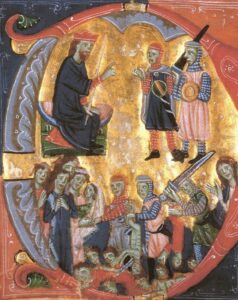The Turn of the World
Each week I read poetry beside Sophia’s tomb, some by other poets, some by Sophia herself. Recently I have been reading a poem each week from the series Sophia wrote as a 16-year-old after visiting an exhibition of illuminated manuscripts, The Medieval Imagination.
In a moment of Jungian synchronicity, the next poem in the sequence to be read a week ago was painfuly relevant to the wider world. It was The Massacre of the Innocents. Reading it stung.
In Christ’s Nativity story, Herod, the king of Judea, was told by the Magi (the Three Wise Men) that they were looking for the baby born to be king. Herod, thinking in completely worldly terms (as those who hold power tend to do), was concerned with a potential political threat, and therefore ordered the massacre of all male infants in the region. They were slaughtered, those innocents. Joseph, however, had been told by an angel to take Mary and Jesus into Egypt. Baby Jesus lived. His own confrontation with Death was yet to come.
It was a collision between worlds, this intersection between the lives of Jesus and Herod, between the world of the spirit and the world of politics and power.
“My kingdom is not of this world,” Jesus says in John’s Gospel. History’s Herods, however, understand nothing of it.
Wars happen in real time, but the true battle takes place in the soul. As Solzhenitsyn memorably observed in The Gulag Archipelago, “The line between good and evil runs through every human heart.”
The battlelines are drawn. The stakes are everything.
A choice is offered to us.
Sophia, in her steadfastness, taught me this.
Live in the light. Do not let the darkness enter in…
*******
The Massacre of the Innocents, Antiphonal (fragmentary)
(Central or North Italy, late thirteenth-early fourteenth century)

There are eleven baby boys
Seven of them lie dead on the ground
Two are in the process of being slaughtered
One is being ripped away from his mother by a soldier
King Herod’s throne rests on the heads of these grieving mothers
His grey hand raised in a mockery of the blessing
(One finger in accusation)
His attendant soldiers rest their feet upon their swords
One of them hefts his (in scabbard) as if asking for clarification
This is an ancient thing
Kings frightened of prophecy ordering massacres
And missing the one they would kill
All rulers are frightened of being supplanted
But of course the whole point of the story is that nothing can be done
Prophecy’s hour comes round
And the creature
Good or evil finds its way to Bethlehem and is born
Nothing can be done except to these mothers
Whose closed mouths are a splash of the same red paint
That is their baby’s blood
But none of these children can baptise the Earth
Enough to wash out the sin of their death
Let alone the sin of Herod
The body and blood that will be a metaphor
Lies somewhere on the flight into Egypt
In the airport lounge of prophecy
Waiting for the turn of the world
By Sophia Nugent-Siegal

very disturbing prophecy. seems relevant for these times. Thanks Robyn
The last stanza of Sophie’s poem gives the answer to fearful times–that is, the promise literally embodied in the little child Mary held in her arms on the flight into Egypt.
Promise made, promise kept.
We keep forgetting…
Solemn and true words Robyn! Thank you.
“Prophecy’s hour” feels once again imminent, doesn’t it…
Solemnity seems the only adequate response to it.